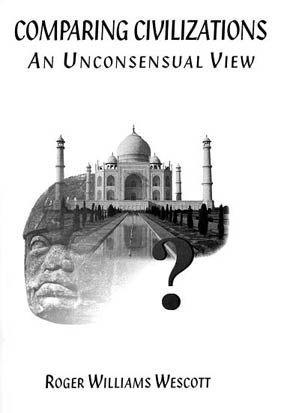"I now believe, however, that, because our entire species has been threatened with extinction by prehistoric and protohistoric disasters of global scope, all human communities, literate as well as preliterate, express the fear of collective demise by means of compulsive rules, roles, and rituals, all involving irrational avoidances. Civilizations, I think, have succeeded in making their group requirements and prohibitions appear better rationalized than pre-civil peoples. But they have not eliminated the basic collective malaise that underlies these beliefs and practices."
“The very notion of inventiveness is, in fact, a relatively modern one. It has been said that the greatest invention of the 19th century was that of the profession of the inventor. Students of the history of civilization, who generally credit the Sumerians with having invented the literate urban way of life, are perennially amazed that the Sumerians themselves took no such credit. Instead, the Sumerians insisted that civilization had been brought to them by an articulate fish-like being named Oan, who emerged from the Persian Gulf. According to their various predilections, modern Westerners have so interpreted this ancient Mesopotamian tradition as to make Oan an aquanaut, an astronaut, or a ufonaut. Yet, however the tradition is re-worded, its central import remains the same: the earliest civilized society of which we have knowledge did not regard itself as the creator but rather as the receiver of civilization.”
|
 |
|

COMPARING CIVILIZATIONS
An Unconsensual View
of Culture–History
by Roger Williams Wescott
ISBN 0-9672671-1-0
paperback
377 pages
ABOUT THE AUTHOR
Roger Williams Wescott graduated summa cum laude and first in his class from Princeton University. After receiving his Ph.D. in Linguistics there in 1948, he held a Rhodes Scholarship at Oxford.  He founded and directed the African Language Program at Michigan State University and founded and chaired the Anthropology Department at Drew University. Dr. Wescott served as President of the Linguistic Association of Canada and the United States, President of the International Society for the Comparative Study of Civilizations, and Vice-President of the Association for the Study of Language in Prehistory, as well as co-editor of the journals Futurics, Forum Linguisticum, and Mother Tongue. His own publications include The Divine Animal: An Exploration of Human Potentiality and Predicting the Past: An Exploration of Myth, Science, and Prehistory. He founded and directed the African Language Program at Michigan State University and founded and chaired the Anthropology Department at Drew University. Dr. Wescott served as President of the Linguistic Association of Canada and the United States, President of the International Society for the Comparative Study of Civilizations, and Vice-President of the Association for the Study of Language in Prehistory, as well as co-editor of the journals Futurics, Forum Linguisticum, and Mother Tongue. His own publications include The Divine Animal: An Exploration of Human Potentiality and Predicting the Past: An Exploration of Myth, Science, and Prehistory.
“Roger Wescott has long been a leader in the study of the comparison of civilizations. His investigations have carried him into an impressive range of areas, from the Celts to the Bini, from Aquaticism to proto-history. As both linguist and anthropologist, he is well equipped to handle such a variety of subjects, and to find valuable connections between them…The book displays a remarkable objectivity and quiet wit, along with a refusal to be bound by conventional opinion. Few writers can cover such ground expertly. This one can, and so his book should appeal to both the enthusiastic amateur and the experienced specialist.”
John P. Sedgwick, Jr.
University of Georgia, Athens, GA
|
|

